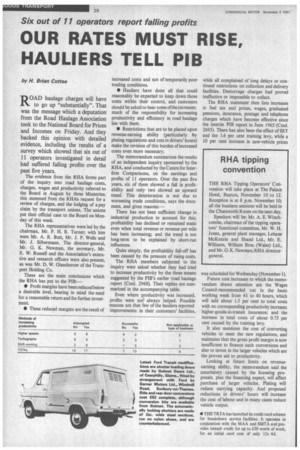OUR RATES MUST RISE, HAULIERS TELL PIB
Page 30

If you've noticed an error in this article please click here to report it so we can fix it.
by H. Brian Cottee
ROAD haulage charges will have to go up "substantially". That was the message which a deputation from the Road Haulage Association took to the National Board for Prices and Incomes on Friday. And they backed this opinion with detailed evidence, including the results of a survey which showed that six out of 11 operators investigated in detail had suffered falling profits over the past five years.
The evidence from the RHA forms part of the inquiry into road haulage costs, charges, wages and productivity referred to the Board in August by three Ministries; this stemmed from the RHAs request for a review of charges, and the lodging of a pay claim by the transport unions. The unions put their official case to the Board on Monday of this week.
The RHA representatives were led by the chairman, Mr. P. H. R. Turner; with him were Mr. A. R. Butt, Mr. J. P. Wells and Mr. J. Silbermann. The director-general, Mr. G. K. Newman, the secretary, Mr. E. W. Russell and the Association's executive and research officers were also present, as was Mr. D. W. Glassborow of the Transport Holding Co.
These are the main conclusions which the RHA has put to the PIB:— • Profit margins have been reduced below a desirable level, bearing in mind the need for a reasonable return and for further investment.
• These reduced margins are the result of increased costs and not of temporarily poor trading conditions.
• Hauliers have done all that could reasonably be expected to keep down those costs within their control, and customers should be asked to bear some ofthe increases; much of the responsibility for increasing productivity and efficiency in road haulage lies with them.
• Restrictions that are to be placed upon revenue-earning ability (particularly by plating regulations and cuts in drivers' hours) make the revision of this burden of increased costs even more necessary.
The memorandum summarizes the results of an independent inquiry sponsored by the RHA, and conducted by the Centre for Interfirm Comparisons, on the earnings and profits of 11 operators. Over the past five years, six of them showed a fall in profitability and only two showed an upward trend. This deterioration is not due to worsening trade conditions, says the document, and gives reasons:—
There has not been sufficient change in industrial production to account for this; profitability has declined or remained static even when total revenue or revenue per mile has been increasing; and the trend is too long-term to be explained by short-run influences.
Quite simply, the profitability fall-off has been caused by the pressure of rising costs.
The RHA members subjected to the inquiry were asked whether they had tried to increase productivity by the three means suggested by the PIB's earlier road haulage report (Cmd. 2968). Their replies are summarized in the accompanying table.
Even where productivity was increased, profits were not always helped. Possible reasons are that few of the hauliers reported improvements in their customers' facilities, while all complained of long delays or continued restrictions on collection and delivery facilities. Demurrage charges had proved ineffective or impossible to collect.
The RHA statement then lists increases in fuel tax and prices, wages, graduated pensions, insurance, postage and telephone charges which have become effective since the interim PIB report in June 1965 (Cmd. 2695). There has also been the effect of SET and the 1.6 per cent training levy, while a 10 per cent increase in new-vehicle prices was scheduled for Wednesday (November 1).
Future cost increases to which the memorandum draws attention are the Wages Council-recommended cut in the basic working week from 41 to 40 hours, which will add about 1.5 per cent to total costs with no corresponding productivity increase; higher-goods-in-transit insurance; and the increase in total costs of about 0.75 per cent caused by the training levy.
It also mentions the cost of converting vehicles to meet the new regulations, and maintains that the gross profit margin is now insufficient to finance such conversions and also to invest in the larger vehicles which are the proven aid to productivity.
Looking at future limits on revenueearning ability, the memorandum said the uncertainty caused by the licensing proposals, plus the financing aspect, will affect purchase of larger vehicles. Plating will reduce carrying capacity. And proposed reductions in drivers' hours will increase the cost of labour and in many cases reduce vehicle output.
• THE TRTA has launched its credit card scheme for breakdown service facilities. It operates in conjunction with the MAA and SMTA and provides instant credit for up to £30 worth of work, for an initial card cost of only 12s 6d.








































































































































